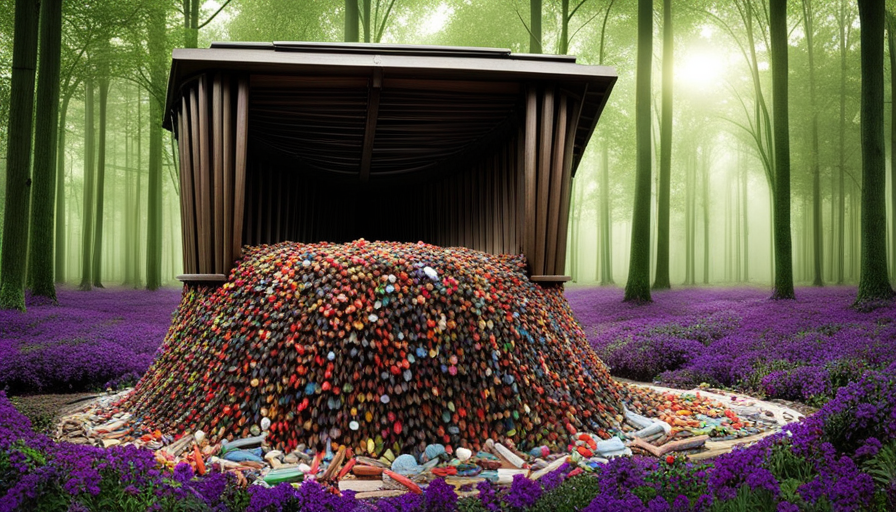You care about the environment and want to do everything in your power to reduce waste. You’ve switched to reusable bags, use a refillable water bottle, and even compost your food scraps. But what about tampons? Can you compost those too?
The short answer is yes, you can compost tampons. However, there are a few things you need to consider before tossing them in your compost bin.
In this article, we’ll take a closer look at the composition of tampons, factors that affect their ability to decompose, and alternative eco-friendly disposal methods. Plus, we’ll give you some tips for reducing tampon waste altogether.
So grab a cup of tea and let’s dive in!
Key Takeaways
- Tampons can be composted with proper conditions.
- Composting process for tampons requires balance of carbon-rich and nitrogen-rich materials.
- Chemicals used in manufacturing tampons must not harm plants or wildlife.
- Organic cotton or biodegradable tampons break down more quickly.
Understanding the Composition of Tampons
Let’s take a peek at what tampons are made of, so we can figure out if they’re compostable! Tampons are typically composed of organic materials like cotton and rayon. These materials make them absorbent and effective for their intended use.
However, the compostability of tampons is a bit more complicated than simply being made of organic materials. Many tampons also contain plastic applicators or wrappers that are not biodegradable. This means that while the cotton and rayon in tampons will eventually break down in a compost pile, the plastic components will remain intact.
It’s important to carefully consider the composition of your tampons before deciding whether or not to add them to your compost bin.
Factors to Consider When Composting Tampons
When composting tampons, it’s important to bear in mind several factors like the decomposition rate and the presence of harmful chemicals.
Tampon material is made of cotton or a blend of synthetic materials such as rayon. Cotton decomposes faster than synthetic materials, but both can break down over time with proper composting conditions.
The composting process for tampons requires a balance of carbon-rich and nitrogen-rich materials to create an environment that promotes decomposition without producing foul odors.
It’s also important to ensure that any chemicals used in the tampon manufacturing process do not leach into the soil and potentially harm plants or wildlife.
As with any compostable material, proper preparation and management are key to successfully composting tampons.
Alternative Eco-Friendly Disposal Methods
If you’re looking for a more environmentally friendly option, consider using menstrual cups or period panties as an alternative to traditional tampons. These options not only reduce waste but also save money in the long run.
Here are a few reasons why:
-
Menstrual cups can last up to 10 years with proper care, meaning less waste and less money spent on disposable products.
-
Reusable pads can be washed and reused multiple times, again reducing waste and saving money.
-
Both options don’t contain harmful chemicals like some traditional tampons, making them safer for your body and the environment.
While it may take some time to adjust to these new methods, they’re worth considering for their benefits both financially and environmentally. Give them a try and see if they work for you!
Tips for Reducing Tampon Waste
To reduce waste from menstrual products, consider opting for reusable options such as cloth pads or menstrual cups that can last up to 10 years with proper care. Not only do these options significantly reduce waste, they also save you money in the long run.
A menstrual cup, for example, can cost around $30 and last up to a decade when properly cared for.
Another way to reduce tampon waste is to switch to organic cotton tampons or those made from biodegradable materials. These types of tampons are designed to break down more quickly than traditional plastic-based ones, reducing their impact on the environment.
Additionally, some companies offer take-back programs where you can send in used tampons and applicators for proper disposal or recycling.
By making small changes like these, you can help make a positive impact on the environment while still taking care of your personal hygiene needs.
Frequently Asked Questions
Are all tampons compostable?
Not all tampons are compostable. However, there are biodegradable tampons and other eco-friendly menstrual products available. It’s important to read the packaging and disposal instructions to ensure proper disposal methods.
Can tampon applicators be composted as well?
Do you know that improperly disposing of tampon applicators can lead to disastrous environmental impacts? Non-compostable tampons and their applicators are a major contributor to waste. Be mindful of your disposal methods.
How long does it take for tampons to decompose in a compost pile?
Tampons take about 6 months to a year to decompose in a compost pile. Their environmental impact is minimal compared to other plastics and synthetic materials commonly found in landfills.
Is it safe to use compost made from tampons on edible plants?
Using tampon compost for non-edible plants is safe, but it’s not recommended for edible ones due to potential contamination. Traditional menstrual products have a negative environmental impact and switching to eco-friendly options can reduce waste.
Can menstrual cups be composted?
Menstrual cups are safe to compost. They have many benefits over tampons, such as being reusable and reducing waste. However, make sure to clean them thoroughly before composting to avoid any potential health hazards.

